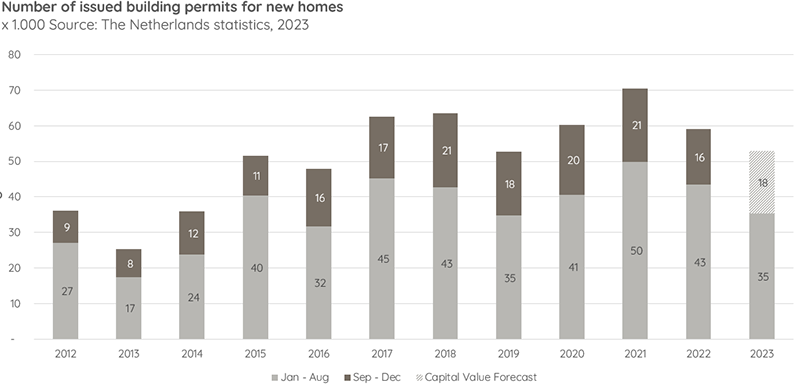Investments in new Dutch rental homes at lowest level in five years
24 oktober 2023
The transaction volume in the Dutch residential investment market reached EUR 2.3 billion in the first three quarters of 2023. This represents a 60% drop compared to last year when the volume reached EUR 5.9 billion in the same period. Although the share of newly built rental properties increased, only EUR 1.47 billion was invested in this segment. The volume is at the lowest level in five years and is only enough to build 6,300 new rental properties this year. This contrasts sharply with demand in the Dutch housing market, which will only increase further in the coming years. Investors are reluctant to invest because of increased interest rates and uncertainty about regulation of the housing market from the government. To prevent a further decline in new-build production, regulatory clarity is needed as soon as possible. Additional incentives are also needed to keep building production going, especially now that the number of building permits is lagging sharply behind.
Active role for housing associations and institutional investors
The EUR 2.3 billion transaction volume in the first three quarters was largely triggered by purchases by housing associations (36%) and institutional investors (33%). This represents a sharp increase in the influence of housing associations in the overall market, as the share of housing associations was still around 23% in 2022. Most of the purchases by housing associations and institutional investors involved newly built rental properties: 76% were invested in new construction.
Investment in new construction too low for housing needs in the Netherlands
In the first three quarters of 2023, housing associations and investors invested a total of EUR 1.47 billion in new construction of rental housing. Investment in expanding the stock of rental housing is thus 41% lower than in the same period last year, and at its lowest level in five years. Total investment in new construction rental housing up to and including the third quarter is expected to be only enough for 6,300 new rental housing units, far too little to reduce the shortage of these units.
To make up for the housing shortage and meet future expansion demand, more than 900,000 homes are needed until 2030. Annually, investors and housing associations will have to build at least 45,000 newly built rental homes to achieve their share of that target. Although housing associations also build homes in-house, these figures already show that the required number will not be met. Both Dutch and international Institutional investors are investing less than in previous years because of uncertainty about housing market regulation and because of increased capital market interest rates. Predictability and long-term stability are important conditions for these parties to invest in new construction projects.
Number of building permits through August 18% lower than last year
Partly as a result of declining investment in new construction by investors, the number of building permits issued is falling. Lower demand for new-build owner-occupied houses also plays a role in this. According to CBS (Statistics Netherlands) the number of building permits issued for houses in the period January to August came to 35,400, down more than 18% compared to the same period last year. If the number of permits issued continues at the same pace, the total for 2023 will not exceed 54,000, according to Capital Value's analyses. This means that significantly fewer new homes can be built in the next two years than in previous years.
Incentives urgently needed
Despite several attempts by Minister De Jonge to keep housing projects going, such as the Housing Impulse Programme and the Start Building Impulse, housing production is declining. Investors are facing increased interest rates, increased transfer tax and regulation of the housing market despite these impulse programmes.
Thijs Konijnendijk, Head of Research bij Capital Value: "More incentives are needed in the very short term to prevent the construction of new rental housing from collapsing further. A situation like in the previous crisis, in which housing construction largely came to a standstill, must be avoided at all costs. In doing so, we simply cannot wait for a new government to take office. There are plenty of concrete measures that can provide a stimulus in the realistic term: we have already argued in favour of lowering VAT for new construction and reducing transfer tax for housing investors. Providing a long-term perspective on these and other measures can give another positive boost to investment in new-build rental housing."
News overview

